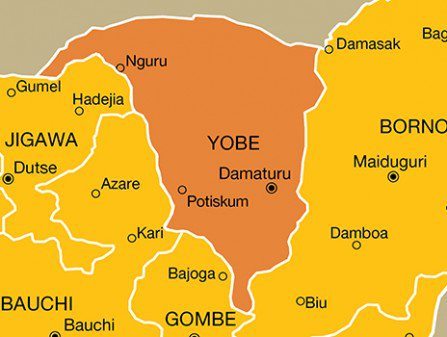Yobe buries 34 victims of ISWAP attack
The remains of the 34 persons massacred by the Islamic State West Africa Province (ISWAP) in Mafa village, Tarmuwa Local Government Area of Yobe State have been buried. Government officials, including the state’s deputy governor, Idi Barde Gubana, and victims’ families on Tuesday gathered in Babbangida town, headquarters of Tarmuwa LGA to bury the bodies […]

The remains of the 34 persons massacred by the Islamic State West Africa Province (ISWAP) in Mafa village, Tarmuwa Local Government Area of Yobe State have been buried.
Government officials, including the state’s deputy governor, Idi Barde Gubana, and victims’ families on Tuesday gathered in Babbangida town, headquarters of Tarmuwa LGA to bury the bodies of the deceased.
Mafa, near Shekau village, the hometown of the late Boko Haram leader, Abubakar Shekau, witnessed a devastating attack that has left the community in mourning.
The attack, which occurred around 4:00 pm on Sunday, saw the terrorists killing scores, looting food and valuables, and destroying numerous homes and shops.
- Nigeria, China sign MoUs as Tinubu meets Xi JinPing
- Kidnapping: I will go to any length to protect you, Sule assures Nasarawa residents
It was gathered that ISWAP targeted the village in retaliation for allegedly providing information to the military, leading to the deaths of ISWAP members.
In a letter written in Arabic, the group claimed responsibility, stating that the villagers’ cooperation with the military justified the brutal attack.
ISWAP accused the villagers of arrogance and betrayal, which led to the massacre.
At the funeral prayer, held at the Emir of Jajere’s palace and led by the Chief Imam of Yobe Mosque and Islamic Centre, Ustaz Hudu Mohammed Yusuf, the deputy governor announced a donation of N30 million to the families of the deceased and injured.
He also directed the State Emergency Management Agency (SEMA) to provide food and relief materials to the victims.
Describing the actions of the insurgents as barbaric and inhumane, the deputy governor urged continuous prayers for peace in the region.
Survivors’ horrific ordeals
Survivors recounted their terrifying experiences during the attack.
Ali Abdullahi, a person with a disability, described how the terrorists initially told villagers to remain calm, only to hunt down and execute those who attempted to flee.
“They went house to house, killing people. They spared me because they saw I was disabled and couldn’t run,” Abdullahi recounted.
Madaki Alhaji Kolobe, who lost his 25-year-old son, shared his grief, revealing that he only learned of his son’s death when he searched the hospital for his relatives.
Abubakar Umar, who left Mafa a day before the attack, lost his parents, brother, and friends.
“Over 125 people were killed, and 34 were buried here in Babbangida,” he lamented.
Brigadier General Abdulsalam Dahiru (Rtd), Special Advisor to the Governor on Security Matters, confirmed the death toll at 34, with five others injured-four critically.
He dismissed rumours of higher casualties, emphasising that the Nigerian Army was the only entity that retrieved the bodies from Mafa.
He condemned ISWAP’s tactics, stating that they target innocent civilians rather than confronting military forces.
Gen. Akilu recommends IBB’s security strategies
Retired Brigadier-General Halliru Akilu, former Chief of Defence Intelligence, has urged Nigerian leaders to adopt the security strategies implemented by former Military President Ibrahim Badamasi Babangida to address the nation’s current security challenges, including banditry and kidnapping.
General Akilu made this call during a Virtual International Colloquium on the Legacies of President Ibrahim Badamasi Babangida, held in Ghana over the weekend.
The event, organised by the Africa Islamic Education Forum, saw participation from former presidents, political leaders, academics, and researchers from across the continent.
General Akilu praised President Babangida’s eight-year tenure, noting that despite facing significant turmoil and uncertainty, his administration took decisive actions to maintain peace and stability.
He described Babangida’s leadership as not only pivotal for Nigeria but also influential for the West African region and the African continent at large.
He highlighted Babangida’s commitment to establishing a foundation of stability, promoting regional integration, and implementing economic reforms. Akilu encouraged contemporary leaders to examine the reforms of Babangida’s era, particularly the restructuring of the defunct Nigerian Security Organisation (NSO) into three new security agencies; the Defence Intelligence Agency (DIA), the National Intelligence Agency (NIA), and the Department of State Services (DSS).
A former Mauritius President, Dr Ameenah Firdaus Gurib-Fakim praised the Babangida era as a time of significant reforms and infrastructure development.
She highlighted the establishment of the SDP and NRC political parties as a positive step towards fostering lasting democracy and urged West African leaders to emulate Babangida’s resilience during ECOMOG operations to enhance regional security.
From Habibu I. Gimba (Damaturu) & Salim U. Ibrahim (Kano)
